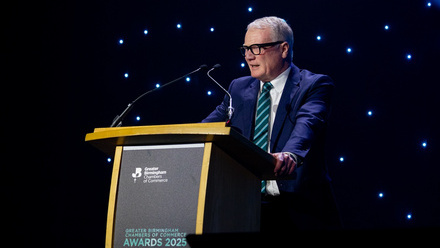‘Godfather of Black British Photography’ receives honorary doctorate from university

An award-winning photographer who created one of the most significant archives of Black British life and culture has been awarded an honorary doctorate by Birmingham City University (BCU).
Born in Jamaica but a Birmingham resident from the age of 14, Dr Vanley Burke says his decision to pick up a camera originated from a desire to “document the struggles of the Black community in Britain”.
He said: "If you are constantly being told by your schoolteacher that you, as a people, had contributed nothing to human civilisation, it is not good to hear.
“I wanted to address this issue. I decided we needed to write our own history, to document our own history, because the life of Black people portrayed in the press wasn’t the life I was experiencing. I decided I would use photography as my tool.”
Called the ‘Godfather of Black British photography’, Vanley has exhibited his work across the world.
He has also travelled to South Africa to document life there following the release of Nelson Mandela, appeared as a guest on BBC Radio 4's Desert Island Discs, received the Paul Hamlyn Award for his contribution to visual art, and had his images featured in television programmes and in books.
One of them was even the inspiration for the title and cover of a UB40 album, Geffery Morgan.
Vanley was given a camera – a Kodak Brownie - by his mother as a present on his 10th birthday while he was still living in rural Jamaica. He began to explore photography when he moved to the UK in 1965 to be with his parents, who ran a grocery store in the heart of Handsworth.
Vanley created a studio in the cellar, started attending evening photography classes, and began compiling a huge bank of images depicting the Black community in Birmingham.
“I started taking photographs of anything and everything,” he said. “It wasn’t about me informing white people. It was to serve our purpose – the Black community - from an historical perspective.”
“People weren’t always aware of what I was trying to do,” said Vanley, whose most famous images are taken in black and white. “So I started bringing with me a box of 10x8 photographs I had taken, so I could show anyone what I was doing.”
Vanley recalls the time he was exiting a building after photographing people playing pool. As he left, an individual warned Vanley he would face repercussions if he ever published photos of him.
Vanley is not sure how many photographs he has taken over the past 60 years. Asked if it could be in the tens of thousands, he replied: “It may well be.”
One of his most iconic photos – ‘Boy with a flag’ - is of a young Black boy posing proudly with his bike in Handsworth Park, a Union Jack flying from the handlebars.
“If the wind didn’t blow at the time, the photo wouldn’t exist,” said Vanley of the 1970 image. “It’s about the right place, the right time, the right execution.”
Vanley lists James Van Der Zee, best known for his portraits of Black New Yorkers, and Gordon Parks, a photojournalist famous for his iconic images of poor Americans during the 1940s, as inspirations. Parks also directed the 1971 film Shaft.
“I wanted to become a photographer, but the idea that this was a career path for someone like me, well, that wasn’t a possibility,” said Vanley. “There wasn’t an outlet for the photographs I was taking. The newspapers weren’t interested in them. Galleries weren’t interested in them.
“I knew what I was doing was important, but it was never about me. It was about us as a people, the Black community as it existed then and now. A group of people treated badly by the press and institutions.”
Vanley’s body of work has earned him worldwide recognition - and it continues to grow. The Vanley Burke Archive is housed at the Library of Birmingham, while his flat in Nechells is also home to thousands of his images.
Vanley’s honorary doctorate from BCU is not his first. He has one from Leicester and Wolverhampton.
Pictured from left to right: BCU Vice-Chancellor Professor David Mba, Vanley Burke and BCU Chancellor Ade Adepitan



